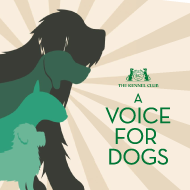
Nine-point plan outlines government measures to protect dog welfare
The Kennel Club has launched a new ‘Voice for Dogs’ manifesto calling on the incoming government to reform dog welfare laws and extend more help to pet owners.
Launched ahead of the General Election (12 December), the nine-point plan sets out key issues facing dogs and their owners in the UK. It also outlines the measures and legislative changes that need to be taken to be put into place to protect the welfare of dogs.
Among the measures listed in the manifesto includes a call to ban to use of electric shock collars, a review of microchipping regulations, and a re-evaluation of the current licensing system for domestic firework use.
The manifesto also highlights the importance of encouraging responsible dog breeding. In 2018, the Kennel Club welcomed the partial integration of its Assured Breeding Scheme into breeding regulations, but is urging the government to further simplify them.
It says that many trustworthy, low-volume home breeders are being put off breeding altogether, leaving a gap in the market that is likely to be filled by rogue puppy traders. The Kennel Club therefore recommends the removal of the ‘business test’ for people who breed one or two litters a year, and to simplify the steps breeders of three or four litters must take to obtain a licence.
Kennel Club’s head of public affairs, Holy Conway, said: “Our manifesto highlights the strides that the Kennel Club has made so far in giving a voice to dogs, but most importantly all that still needs to be achieved.
“Prior to the election being called, we welcomed firm commitments concerning shock collars and animal cruelty sentences, and it has been incredibly disappointing that these have been halted. We look forward to working with an incoming government to ensure these previous obligations are prioritised and that further measures are put in place to protect the welfare of dogs.”



 The Animal and Plant Health Agency (APHA) has updated its online reporting service for dead wild birds.
The Animal and Plant Health Agency (APHA) has updated its online reporting service for dead wild birds.